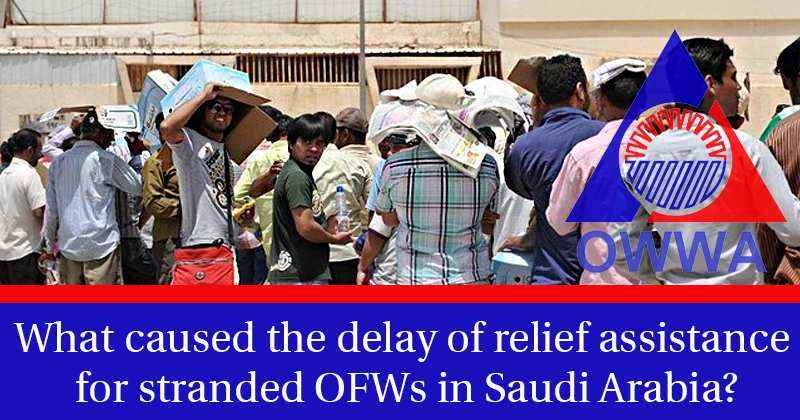11 Aug What caused the delay of relief assistance for stranded OFWs in Saudi Arabia?
Overseas Workers Welfare Administration (OWWA) has already started sending their relief assistance to thousands of OFWs. But the lack of manpower and records halted the relief assistance to stranded OFWs in Saudi Arabia, OWWA said.
On August 9, Tuesday, Emma Sinclair, OWWA Director admitted that due to the lack of master list holding the names of stranded OFWs, they are having troubles in extending financial assistance to beneficiaries.
According to the Department of Labor and Employment (DOLE), it has been months of crisis to OFWs who lost their jobs. There are more than 11,000 migrant workers in 3 major cities of Saudi Arabia namely, Riyadh, Jeddah and Damman/Al-Khobar.
Aside from the lack of names, OWWAs aid to OFWs has delayed due to the shortage of manpower given the number of areas to be visited.
As of August 7, there were 1,495 OFWs who was given P20,000 cash assistance according to OWWA.
Starting on August 10 to September 10, personnel from the Department of Foreign Affairs (DFA), the Department of Health (DOH), and the Department of Social Welfare and Development (DSWD) will be sent to Saudi Arabia for a month-long intervention for the stranded OFWs.
DFA seeks to deliver basic care, such as medicines and social support for the stranded OFWs. They will also provide immediate humanitarian, legal, and other consular assistance to the jobless Filipinos in Saudi Arabia.
While DSWD said that they aim to monitor the situations of undocumented OFWs in crises, especially the women and children, and facilitate the services they need. They would also conduct psychosocial interventions, counseling, and debriefing for the upset workers.
Judy Taguiwalo, Social Welfare Secretary said, “Our fellow Filipinos are in serious crisis because their employers did not pay their salaries. They are also confronted by many difficulties caused by the expiry of their end-of-services benefits. Many were not given exit visas after they completed their contracts, and are being delayed for repatriation.”



No Comments